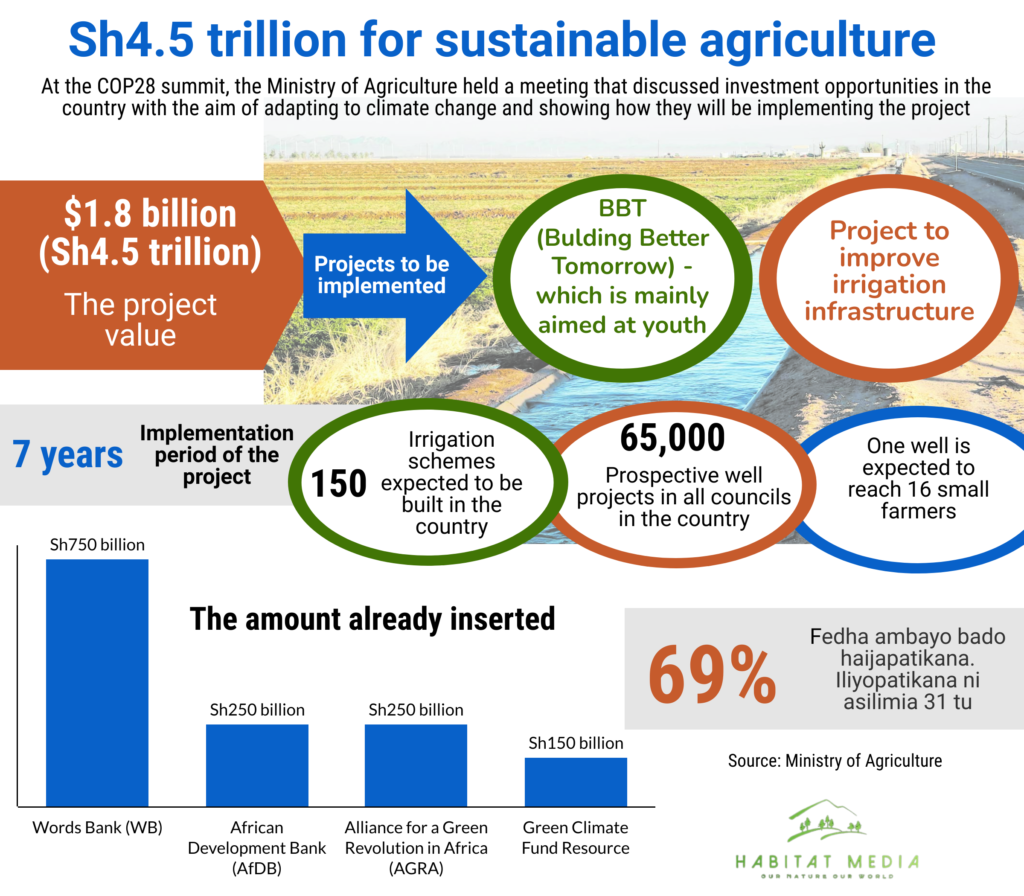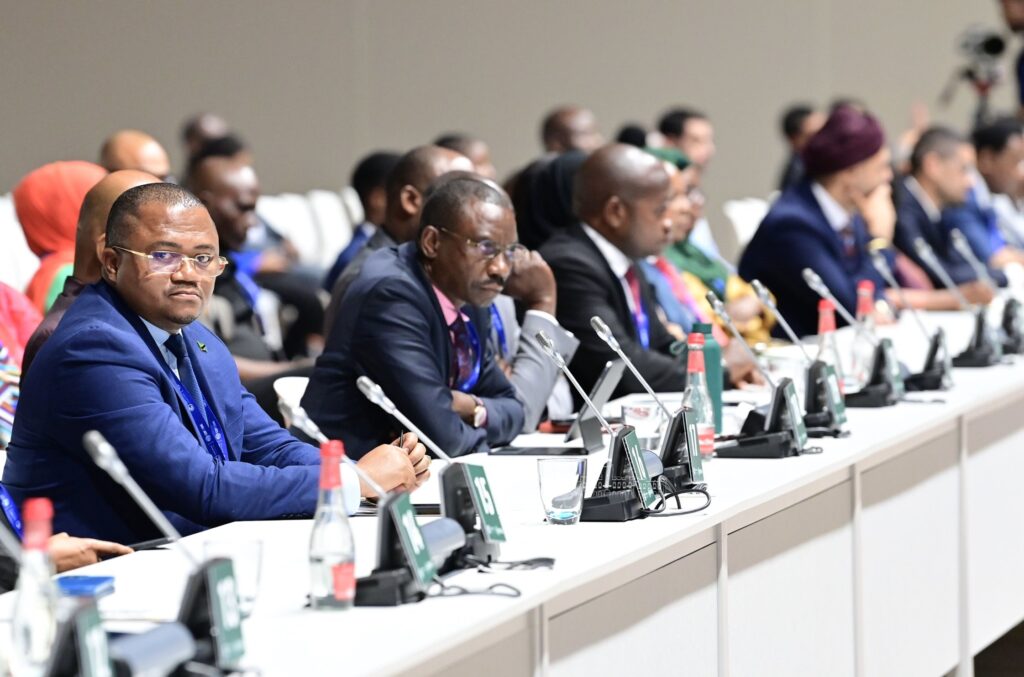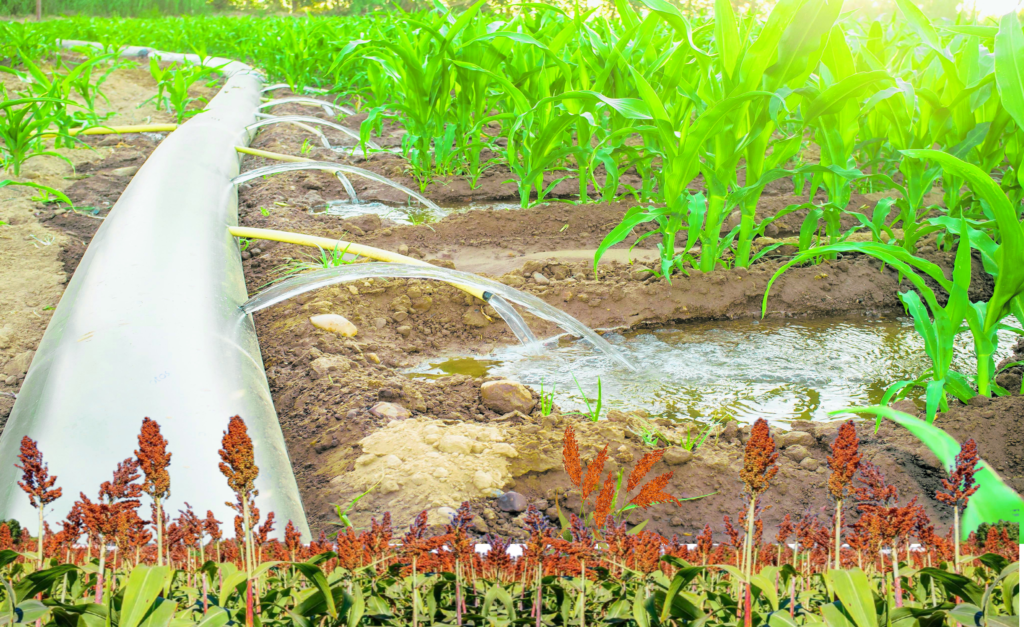The government seeks Sh4.5 trillion for green agriculture reforms
Tanzania needs $1.8 billion (Sh4.5 trillion) to implement seven-year “green agriculture reforms “aimed at dealing with climate change.
In a strategic agricultural meeting on December 4, 2023, organized by the Ministry of Agriculture and various development stakeholders, the governments showed opportunities for green-grown transformation in an ongoing COP28 meeting in Dubai, the United Arab Emirates (UAE), for countries under the United Nations Framework Convention on Climate Change (UNFCCC-COP28).
The meeting was hosted by President Samia Suluhu Hassan, who made a country statement that showed the seven-year plan for how Tanzania is going to achieve sustainable agriculture for climate change (Climate Smart Agriculture, or CSA).
According to President Samia, the plan aims to increase employment for young people, the largest group in the country, and to deal with climate change while making Tanzania a food hub in the East and Central Africa region.
“We need to change and do sustainable agriculture by supporting various innovations that are compatible with the current situation. This project needs money. However, getting money to finance these activities has continued to be difficult,” said the president.
Before the President made the statement, the ministry presented a short, three-minute film that showed the real situation of Tanzanian farmers, the challenges they go through to meet the needs of their families, and how they are forced to engage in other activities such as cutting trees to get charcoal and firewood to make a living due to the stagnation of agriculture.
The ministry also highlighted the investment opportunities available in the country by mentioning the ongoing BBT project (Building a Better Tomorrow) and the large expansion of irrigation infrastructure.
Agriculture Minister Hussein Bashe said $1.8 billion is a lot of money, and so far the World Bank (WB) has inserted $300 million (Sh750 billion), while $20 million (Sh50 billion) is expected to go to Zanzibar.
“The African Development Bank (AfDB) has provided $100 million ($250 billion), and the Alliance for a Green Revolution in Africa (Agra) has provided $40 million (Sh100 billion),” said Bashe, while the other stakeholders who provided money were the Green Climate Fund Resource, which inserted $60 million (Sh150 billion).
This makes a total of $560 million, equivalent to 31 percent of the required amount.
According to the ministry, the agricultural development plan aimed at improving the livelihoods of small-scale farmers by giving them access to 150 purported irrigation schemes and 65,000 well projects, each of which is purported to benefit 16 farmers under 2.6 hectares of farms, all for the betterment of farming activities and agribusinesses.
Thus, at least 1.4 million small-scale farmers in the country can be reached.

Stakeholder’s views
The Chairman of the Board of Directors of AGRA, who is also the former Prime Minister of Ethiopia, Hailemariam Dessaleg, said that Tanzania is a center for agriculture and an innovator of food systems, and they are convinced that it can feed Africa and more.
“Due to the existing capacity and leadership, I want to say that we are here to contribute to ongoing programs in Tanzania, especially the BBT project. Also yesterday, we made a statement about contributing to a project to reduce post-harvest loss in seven African countries, including Tanzania, and $100 million has been provided,” he said.
Local CRDB bank director Abdulmajid Nsekela said, “We continue to design services that will help farmers, and we will continue to contribute to the agricultural value chain.”
Another local bank lender, the Executive Director of the Agricultural Development Bank (TADB), Frank Nyabundege, said they need to contribute to sustainable farming, and to achieve that, affordable loans will be given to farmers.
“We need to provide affordable loans to enable farmers to move to climate-resilient agriculture, which is good for the environment, and until now we have established a special funding program for agriculture,” he explained.
AFDB Vice President Dr. Beth Dunford said that despite the money they gave to BBT last month at the Africa Food Systems Conference, they will continue to cooperate with the country due to the satisfactory direction of the sector in the country.
Another stakeholder, Rodger Voorhies from BGMF (Bill and Melinda Gates Foundation), said, ‘…I realize the efforts made by the government and promise we will continue to work with AGRA, who work closely with the Ministry of Agriculture… to invest in seed… and we will continue to work with the private sector in the areas of drugs and breeding.
On her part, Sarah Gordon-Gibson, a World Food Program (WFP) representative in the country, said, “We will continue to support the agricultural value chain, starting with inputs and education for harvest loss, financing, food storage, supporting irrigation agriculture, and WFP will buy the produce locally.”

This story was produced with support from MESHA and the IDRC Eastern and Southern Africa office.



Good story
thanx
Your article helped me a lot, is there any more related content? Thanks!
Your point of view caught my eye and was very interesting. Thanks. I have a question for you.
Your article helped me a lot, is there any more related content? Thanks! https://accounts.binance.com/en/register?ref=JHQQKNKN